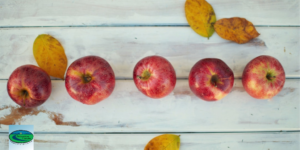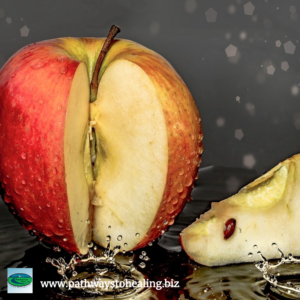By Dr. Alyssa Musgrove
 “An apple a day keeps the doctor away” – it’s a saying we have all heard at some point in our lives. Caroline Taggart, author of An Apple a Day: Old-Fashioned Proverbs and Why They Still Work, says this saying came from Wales in the 1860s. The original verbiage was, “Eat an apple on going to bed, and you’ll keep the doctor from earning his bread.”
“An apple a day keeps the doctor away” – it’s a saying we have all heard at some point in our lives. Caroline Taggart, author of An Apple a Day: Old-Fashioned Proverbs and Why They Still Work, says this saying came from Wales in the 1860s. The original verbiage was, “Eat an apple on going to bed, and you’ll keep the doctor from earning his bread.”
So, does an apple a day really keep the doctor away? A JAMA Internal Medicine study sought to find out just that. The result? Evidence does not support that an apple a day keeps the doctor away. Data showed only 39% of apple eaters avoided physician visits versus 33% of non-apple eaters. But don’t let a lack of firm scientific evidence cause you to completely overlook the humble apple. Turns out this American favorite actually boasts many health benefits.
Apples contain a large number of phytochemicals including quercetin, which is a flavonoid. Flavonoids are a diverse group of plant chemicals found in almost all fruits and vegetables and are what give flowers and fruits their bright colors. Flavonoids provide many health benefits such as antioxidants, which help to protect against cancer, and other anti-inflammatory agents. Quercetin flavonoids are thought to protect against “bad,” LDL cholesterol and could help to lower blood pressure.
Additionally, results of a study published by the Journal of Food Science, suggest that fresh apples, bananas and oranges in our daily diet, along with other fruits, may protect neuron cells against oxidative stress-induced neurotoxicity and may play an important role in reducing the risk of neurodegenerative disorders such as Alzheimer’s disease.
When I conduct nutritional consultations, one of the topics I always discuss is gut health. As it turns out, apples have a place in that discussion. Apples provide pectin, a soluble fiber that is also a prebiotic. A prebiotic is a non-digestible dietary nutrient, which beneficially influences intestinal bacteria by stimulating their growth. These “friendly” bacteria fight inflammation and prevent a host of digestive problems. In essence, apples provide your gut bacteria the food they need to do their job.
Within the last year, half a dozen studies have touted the benefits of apple peels. One study in the journal Nutrition and Cancer found the peels of organic Gala apples, “showed a significant decrease in growth and survival of human prostate carcinoma and breast carcinoma.” The study concludes, “Apple peels may possess strong anti-proliferative effects against cancer cells, and [they] should not be discarded from the diet.”
 Apple peels have the highest concentration of nutrients, so keep the peel on. But, when eating the peel, remember that organic is the best choice. The Environmental Working Group has listed apples on its annual “Dirty Dozen” list for the last several years. Moreover, while it might be easier to “drink” your apples in the form of fruit juice, you may be better off sticking with the whole fruit. A study in the British Medical Journal found juice drinkers were at a higher risk of type 2 diabetes, while those who consumed three servings per week of whole apples, blueberries, grapes, raisins or pears reduced their type 2 diabetes risk by 7%.
Apple peels have the highest concentration of nutrients, so keep the peel on. But, when eating the peel, remember that organic is the best choice. The Environmental Working Group has listed apples on its annual “Dirty Dozen” list for the last several years. Moreover, while it might be easier to “drink” your apples in the form of fruit juice, you may be better off sticking with the whole fruit. A study in the British Medical Journal found juice drinkers were at a higher risk of type 2 diabetes, while those who consumed three servings per week of whole apples, blueberries, grapes, raisins or pears reduced their type 2 diabetes risk by 7%.
Healthy to the core, but that’s where it stops. Why? Well, inside the core of an apple lies its reproductive component — the seed, or pip — which can release cyanide, a powerful poison, when it comes into contact with your digestive enzymes. Not to worry too much though. One or two of these seeds will not be harmful to an adult, but if a child swallows a large number of seeds you should seek medical attention immediately.
Pathways to Healing specializes in holistic chiropractic care. Dr. Alyssa Musgrove draws on a variety of techniques, including chiropractic, kinesiology, nutrition, food allergy testing and lifestyle counseling to assist clients in achieving optimal health and wellness in one setting. In addition, the practice is committed to being a valuable source of information so that people can learn how to live a healthy lifestyle and prevent future illness. Pathways to Healing is located at 1022 Founders Row, Lake Oconee Village, Greensboro. The office can be reached at 706-454-2040.
